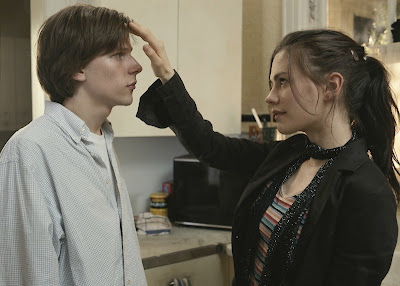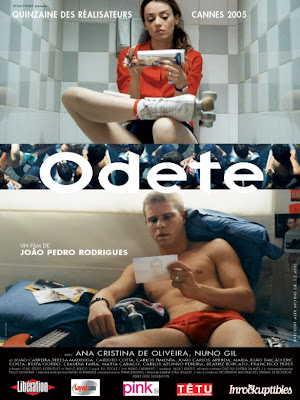
For the sake of not going on a tirade about you-know-what, I'll just leave the awards section without any commentary. So here it is.
Cannes, held 11-22 May 2005
 Palme d'Or
Palme d'Or:
L'enfant [d. Jean-Pierre Dardenne, Luc Dardenne]
Grand Prix:
Broken Flowers [d. Jim Jarmusch]
Prix du jury:
Shanghai Dreams [d. Wang Xiaoshuai]
Best Director: Michael Haneke -
Caché
Best Actor: Tommy Lee Jones -
The Three Burials of Melquiades Estrada
Best Actress: Hana Laszlo -
Free Zone
Best Screenplay: Guillaume Arriaga -
The Three Burials of Mesquiades Estrada
Technical Grand Prize: (tie) Leslie Shatz -
Last Days (for the sound design); Robert Rodriguez -
Sin City (for the visual shaping)
Camera d'Or: (tie)
Me and You and Everyone We Know [d. Miranda July],
The Forsaken Land [d. Vimukthi Jayasundara]
Venice, held 31 August-10 September 2005
 Golden Lion
Golden Lion:
Brokeback Mountain [d. Ang Lee]
Grand Special Jury Prize:
Mary [d. Abel Ferrara]
Best Director: Philippe Garrel -
Les amants réguliers (
Regular Lovers)
Best Actor: David Strathairn -
Good Night, and Good Luck.
Best Actress: Giovanna Mezzogiorno -
La bestia nel cuore (
Don't Tell)
Best Screenplay: George Clooney, Grant Heslov -
Good Night, and Good Luck.
Career Golden Lion: Manoel de Oliveira, Stanley Donen
Toronto, held 8-17 September 2005
 People's Choice Award
People's Choice Award:
Tsotsi [d. Gavin Hood]
Discovery Award:
Look Both Ways [d. Sarah Watt]
Best Canadian Feature:
C.R.A.Z.Y. [d. Jean-Marc Vallée]
Berlin, held 10-20 February 2005
 Golden Bear
Golden Bear:
U-Carmen [d. Mark Dornford-May]
Best Director: Marc Rothermund -
Sophie Scholl: Die letzten Tage (
Sophie Scholl: The Last Days)
Best Actor: Lou Taylor Pucci -
Thumbsucker
Best Actress: Julie Jentsch -
Sophie Scholl: Die letzten Tage
Jury Grand Prix:
Peacock [d. Gu Changwei]
Outstanding Artistic Achievment:
The Wayward Cloud [d. Tsai Ming-liang]
Honorary Golden Bear: Fernando Fernán Gómez, Im Kwon-taek
Teddy (Feature):
Un año sin amor (
A Year Without Love) [d. Anahí Berneri]
Teddy (Documentary):
Katzenball [d. Veronika Minder]
Sundance, held 20-30 January 2005
 Grand Jury Prize
Grand Jury Prize (Dramatic):
Forty Shades of Blue [d. Ira Sachs]
Grand Jury Prize (World Cinema):
O Herói (
The Hero) [d. Zézé Gamboa]
Grand Jury Prize (Documentary):
Why We Fight [d. Eugene Jarecki]
Grand Jury Prize (World Cinema Documentary):
Shape of the Moon [d. Leonard Retel Helmrich]
Director (Dramatic): Noah Baumbach -
The Squid and the Whale
Director (Documentary): Jeff Feuerzeig -
The Devil and Daniel Johnston
Special Jury Prize (Dramatic): (tie) Rian Johnson -
Brick; Miranda July -
Me and You and Everyone We Know (for originality of vision); Amy Adams -
Junebug; Lou Taylor Pucci -
Thumbsucker (for their performances)
Special Jury Prize (World Cinema): (tie) Jorge Gaggero -
Cama adentro (
Live-In Maid); Maren Ade -
Der Wald vor Iauter Bäumen (
The Forest for the Trees)
Special Jury Prize (Documentary): (tie) Jessica Sanders -
After Innocence; Geoffrey Richman, Conor O'Neill -
Murderball (for the editing)
Special Jury Prize (World Cinema Documentary): (tie) Simone Bitton -
Mur (
Wall); Sean McAllister -
The Liberace of Baghdad
Cinematography (Dramatic): Amy Vincent -
Hustle & Flow
Cinematography (Documentary): Gary Griffin -
The Education of Shelby Knox
Audience Award (Dramatic):
Hustle & Flow [d. Craig Brewer]
Audience Award (Documentary):
Murderball [d. Henry Alex Rubin, Dana Adam Shapiro]
Audience Award (World Cinema):
Brødre (
Brothers) [d. Susanne Bier]
Audience Award (World Cinema Documentary):
Shake Hands with the Devil: The Journey of Roméo Dallaire [d. Peter Raymont]
Academy Awards, held 5 March 2006
 Best Picture
Best Picture:
Crash [d. Paul Haggis]
Best Director: Ang Lee -
Brokeback Mountain
Best Actor: Philip Seymour Hoffman -
Capote
Best Actress: Reese Witherspoon -
Walk the Line
Best Supporting Actor: George Clooney -
Syriana
Best Supporting Actress: Rachel Weisz -
The Constant Gardener
Best Original Screenplay: Paul Haggis, Robert Moresco -
Crash
Best Adapted Screenplay: Larry McMurtry, Diana Ossana -
Brokeback Mountain
Best Cinematography: Dion Beebe -
Memoirs of a Geisha
Best Documentary:
La marche de l'empereur (
March of the Penguins) [d. Luc Jacquet]
Best Foreign Film:
Tsotsi [d. Gavin Hood]
Animated Feature:
Wallace & Gromit in The Curse of the Were-Rabbit [d. Steve Box, Nick Park]
Honorary Award: Robert Altman
BAFTAs, held 19 February 2006
 Best Film
Best Film:
Brokeback Mountain [d. Ang Lee]
Best Director: Ang Lee -
Brokeback Mountain
Best British Film:
Wallace & Gromit in The Curse of the Were-Rabbit [d. Steve Box, Nick Park]
Best Actor: Philip Seymour Hoffman -
Capote
Best Actress: Reese Witherspoon -
Walk the Line
Best Supporting Actor: Jake Gyllenhaal -
Brokeback Mountain
Best Supporting Actress: Thandie Newton -
Crash
Best Original Screenplay: Paul Haggis, Robert Moresco -
Crash
Best Adapted Screenplay: Larry McMurtry, Diana Ossana -
Brokeback Mountain
Best Cinematography: Dion Beebe -
Memoirs of a Geisha
Film Not in the English Language:
De battre mon coeur s'est arrêté (
The Beat That My Heart Skipped) [d. Jacques Audiard]
European Film Awards, held 3 December 2005
 Best Film
Best Film:
Caché [d. Michael Haneke]
Best Director: Michael Haneke -
Caché
Best Actor: Daniel Auteuil -
Caché
Best Actress: Julia Jentsch -
Sophie Scholl: Die letzten Tage (
Sophie Scholl: The Last Days)
Best Cinematography: Franz Lustig -
Don't Come Knocking
Best Screenplay: Hany Abu-Assad, Bero Beyer -
Paradise Now
Best Documentary:
Un dragon dans les eaux pures du Caucase (
The Pipeline Next Door) [d. Nino Kirtadze]
Discovery:
Anklaget (
Accused) [d. Jacob Thuesen]
Screen International:
Good Night, and Good Luck. [d. George Clooney]
Audience Award (Actor): Orlando Bloom -
Kingdom of Heaven
Audience Award (Actress): Julia Jentsch -
Sophie Scholl: Die letzten Tage
Audience Award (Director): Marc Rothemund -
Sophie Scholl: Die letzten Tage
Life Achievement Award: Sean Connery
Independent Spirit, held 4 March 2006
 Best Feature
Best Feature:
Brokeback Mountain [d. Ang Lee]
Best First Feature:
Crash [d. Paul Haggis]
Best Director: Ang Lee -
Brokeback Mountain
Best Male Lead: Philip Seymour Hoffman -
Capote
Best Female Lead: Felicity Huffman -
Transamerica
Best Supporting Male: Matt Dillon -
Crash
Best Supporting Female: Amy Adams -
Junebug
Best Screenplay: Dan Futterman -
Capote
Best First Screenplay: Duncan Tucker -
Transamerica
Best Cinematography: Robert Elswit -
Good Night, and Good Luck.
Best Documentary:
Enron: The Smartest Guys in the Room [d. Alex Gibney]
Best Foreign Film:
Paradise Now [d. Hany Abu-Assad]
John Cassavetes Award (for features made for under $500,000):
Conventioneers [d. Mora Stephens]
Someone to Watch Award: Neill Dela Llana, Ian Gamazon -
Cavite
Golden Globes, held 16 January 2006
 Picture
Picture (Drama):
Brokeback Mountain [d. Ang Lee]
Picture (Comedy/Musical):
Walk the Line [d. James Mangold]
Director: Ang Lee -
Brokeback Mountain
Actor (D): Philip Seymour Hoffman -
Capote
Actress (D): Felicity Huffman -
Transamerica
Actor (M/C): Joaquin Phoenix -
Walk the Line
Actress (M/C): Reese Witherspoon -
Walk the Line
Supporting Actor: George Clooney -
Syriana
Supporting Actress: Rachel Weisz -
The Constant Gardener
Screenplay: Larry McMurtry, Diana Ossana -
Brokeback Mountain
Foreign Film:
Paradise Now [d. Hany Abu-Assad]
Cecil B. DeMille Award: Anthony Hopkins
Césars Awards, held 25 February 2006
 Best Film
Best Film (Meilleur film):
De battre mon coeur s'est arrêté (
The Beat That My Heart Skipped) [d. Jacques Audiard]
Best Director (Meilleur réalisateur): Jacques Audiard -
De battre mon coeur s'est arrêté
Best Actor (Meilleur acteur): Michel Bouquet -
Le promeneur du champ de Mars (
The Last Mitterrand)
Best Actress (Meilleure actrice): Nathalie Baye -
Le petit lieutenant
Best Supporting Actor (Meilleur acteur dans un second rôle): Niels Arestrup -
De battre mon coeur s'est arrêté
Best Supporting Actress (Meilleure actrice dans un second rôle): Cécile De France -
Les poupées russes (
Russian Dolls)
Most Promising Actor (Meilleur espoir masculin): Louis Garrel -
Les amants réguliers (
Regular Lovers)
Most Promising Actress (Meilleur espoir féminin): Linh Dan Pham -
De battre mon coeur s'est arrêté
Best Original Screenplay (Meilleur scénario original): Radu Mihăileanu, Alain-Michel Blanc -
Va, vis et deviens (
Live and Become)
Best Adapted Screenplay (Meilleur scénario adaptation): Jacques Audiard, Tonino Benacquista -
De battre mon coeur s'est arrêté
Best Cinematography (Meilleure photographie): Stéphane Fontaine -
De battre mon coeur s'est arrêté
Best Foreign Film (Meilleur film étranger):
Million Dollar Baby [d. Clint Eastwood]
Best First Film (Meilleur premier film):
Darwin's Nightmare [d. Hubert Sauper]
Honorary César: Hugh Grant, Pierre Richard
Razzies, given 4 March 2006
 Worst Film
Worst Film:
Dirty Love [d. John Mallory Asher]
Worst Director: John Mallory Asher -
Dirty Love
Worst Actor: Rob Schneider -
Deuce Bigalow: European Gigolo
Worst Actress: Jenny McCarthy -
Dirty Love
Worst Supporting Actor: Hayden Christensen -
Star Wars: Episode III - The Revenge of the Sith
Worst Supporting Actress: Paris Hilton -
House of Wax
Worst Screenplay: Jenny McCarthy -
Dirty Love
Worst Remake/Sequel:
Son of the Mask [d. Lawrence Guterman]
 Moartea domnului Lăzărescu [The Death of Mr. Lăzărescu] – dir. Cristi Puiu
Moartea domnului Lăzărescu [The Death of Mr. Lăzărescu] – dir. Cristi Puiu With: Ion Fiscuteanu, Luminiţa Gheorghiu, Gabriel Spahiu
With: Ion Fiscuteanu, Luminiţa Gheorghiu, Gabriel Spahiu


















































